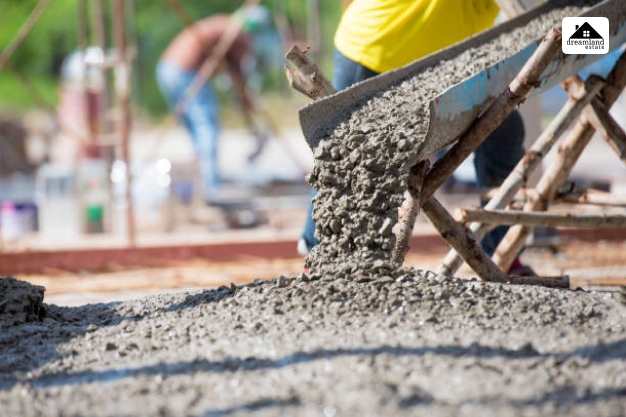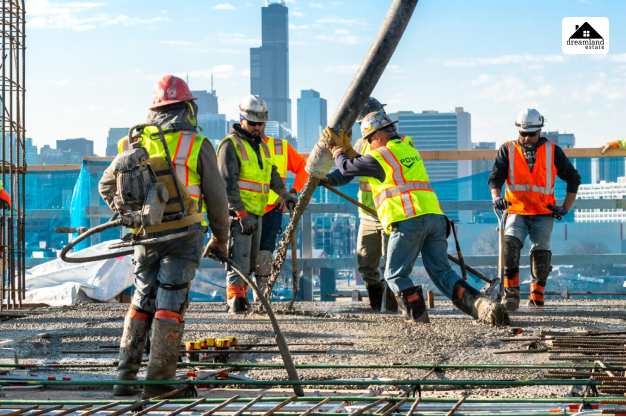A Step By Step Guide To Become A Concrete Contractor

Concrete installation is more than simple mixing and pouring. Just like any other job, this has its complications and a fair share of challenges to face.
If construction is your forte and creation is your first choice, then becoming a concrete contractor might be the job for you. Concrete installation is the first step in every construction. It is the firm foundation on which every skyscraper stands.
So, this, in turn, proves my point when I say that concrete contractors don’t have it easy. However, if you are up for the challenge, then you have stumbled upon the perfect article.
Sit back as in the excerpt below; I will be discussing all the nitty-gritty details of becoming a concrete installation contractor, whether for small households or major commercial concrete contractors. Additionally, it will include some pressing questions about this occupation on the internet.
What Is A Concrete Contractor?
Now, a general assumption would be that you already know this since you stumbled across this article. However, for those who don’t understand completely, here is the answer.
A concrete contractor is an individual who oversees the entire process of concrete installation before the construction starts. This person will have a team underneath, and they will handle all the steps to build the foundation base.
From the pour to finish, it is all their work to supervise.
How To Become A Concrete Contractor?
We are now coming to the most critical question. Here is a step-by-step guide to becoming a concrete contractor.
You Have To Earn a Degree First
This is the reason why I said, ‘it is not just about mixing and pouring’ because you cannot move forward without the proper education. There are two options for you to choose from, depending on your preferences.
You can either become a civil engineer or have a college degree in Physics, chemistry, or fluid mechanics. After your college degree, you can also opt for some special courses for concrete contractors.
The Contractor License And Insurance
Concrete installation, whether it is just for some small house or a giant skyscraper, is the same, and the work is entirely responsible. So, from such a severe standpoint, it is understandable that these individuals will need a license and insurance for every person who works under them.
The work being serious is also dangerous at the same time. Therefore, this is the reason why you need the following insurance to become a concrete contractor.
- Property insurance
- General Liability
- Commercial Automotive
- Worker’s compensation
- Equipment insurance
Qualifications Of A Concrete Foundation Contractor
As discussed before, the qualifications are the same. However, if you want to see to it that a good business has been set up, then having a business degree, MBA, or some extra course in business management would be the right thing to do.
Although business should be a choice, it is always advised to have a business course along with the other preferred ones. Because in the long run, you will have the will to open a business.
A concrete contractor is also popularly known as a cement contractor because cement is the base tool for your work.
How Much Does A Concrete Contractor Make?
To give you a benchmark of the entire thing, I will provide you with an approximate amount for the highest to lowest.
- A measured amount of sand unfolds evenly.
- The required amount of cement has to be dumped into the sand and unfolded evenly.
- You need to combine the sand and cement in detail with a spade before turning the combination time and again till it’s of an even color for a long duration to be loose from streaks.
- The sand and cement combination is then unfolded, and a measured amount of coarse mixture is unfolded on its top. Simultaneously, the measured amount of coarse mixture is unfolded, and the sand cement combination is then unfolded on its top.
- Afterward, you must combine as a minimum of 3 instances through the shoveling and turn over through twisting from middle to side, then again to the middle, and once more to the sides.
- Then, you make a hole inside the center of the combined pile.
- You need to deliver three-quarters of the entire amount of water required while the substances are twisted to accumulate closer to the middle with spades.
Ultimately, you can deliver water through a water outfitted with a rose head, slowly turning it again for the given time till a uniform shade and consistency are acquired at some stage in the pile.
- 5% of the cement is required to be delivered into the blending device, while hand blend cement for the concrete is produced.
- The required PPE (Personal Protective Equipment) will be worn with the aid of the laborers and masons while blending and dealing with the concrete.
- You need to wash the blending platform.
- A building contractor has access to every tool to do the job perfectly; Thus, you should always be familiar with the basics as well.
Rules Of Concrete Pouring
According to the rule of thumb, align the formation in order so that the completed concrete floor will slope at a minimum of one-quarter inch for every foot of the journey. In other words, an eight-foot lengthy patio must be a minimum of two inches better on one end than the other one.
The factors that have to be kept in mind before concrete pouring are the shape, size, and finish of the formation. The minimum thickness for the concrete should be around 1.5 inches.
Check whether the formation is stable and tight before pouring the concrete solution.
What Are The Concrete Pouring Tools?
The concrete pouring tools are…
- A straightedge or Concrete screed
- A bull float
- Concrete rake or Kumalong
- Mag float
- Concrete boots
What Is The Minimum Curing Period?
The minimum period for curing the concrete installation is seven days. In these seven days, the concrete contractor has to take care of the drying period and keep an eye on them.
The maximum curing period to get the maximum strength is 28 days.
Water curing also has to be checked and done at least three times a day, which again is a concrete contractor’s responsibility.
How Do I Start A Concrete Construction Company?
Here are the steps you should follow if you want to open a concrete construction company.
First of all, a business degree is significant.
- Then, you have identified the market. Do you want your company to be for houses or massive commercial foundations?
- Remember to get the license and insurance correctly.
- Make a blueprint that can make a profit.
- Get the required materials and labor.
- Get a source that can start funding your business.
- Advertise for the final launch.
To Conclude
Being a concrete contractor is a challenging task; it has responsibilities and dangers. So, when you decide to become one, make sure that the correct education is taken and that the correct experience grows to gain credibility.
This article was of help, and you will let us know your feedback. Please send us more questions than we can answer next.
Read Also:














Leave A Reply